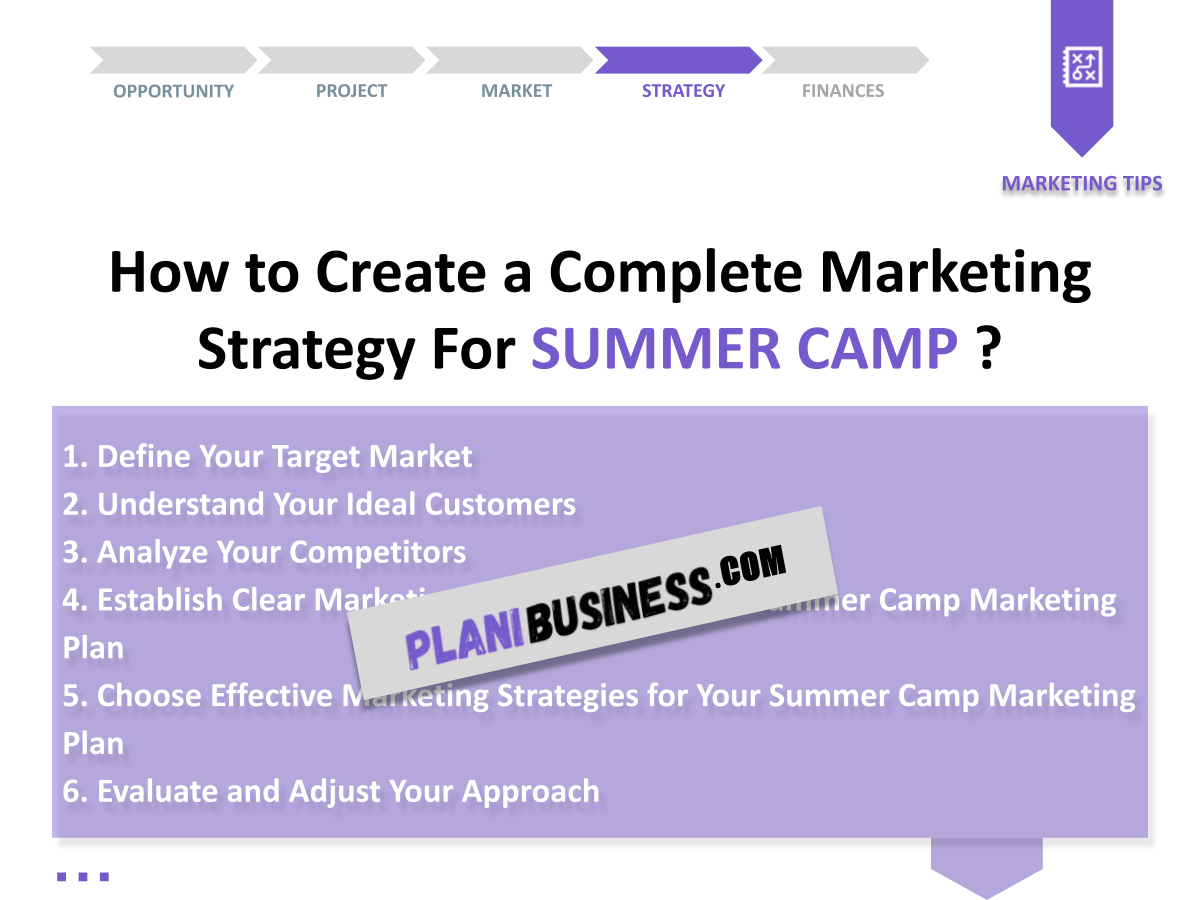Are you thinking about starting a Summer Camp Marketing Plan? You’re not alone! Many camp organizers struggle with how to effectively promote their programs and attract campers. Did you know that summer camps that actively market themselves can see enrollment increase by up to 50%? A solid Summer Camp Marketing Plan can make all the difference. It’s not just about filling spots; it’s about creating memorable experiences that parents and kids will talk about for years to come.
A Summer Camp Marketing Plan is a strategic approach to promote your summer camp, targeting potential campers and their families through various channels. In this article, we’ll explore:
- How to define your target market
- Understanding your ideal customers
- Analyzing your competitors
- Establishing clear marketing objectives
- Choosing effective marketing strategies
- Evaluating and adjusting your approach
1. Define Your Target Market
| Demographic | Age Group | Interests |
|---|---|---|
| Families | 5-12 years | Outdoor activities, arts and crafts |
| Teens | 13-17 years | Adventure sports, leadership |
Identifying your target market is crucial. Knowing who your campers are helps tailor your marketing efforts. You might focus on families with young children or teens looking for adventure. This understanding allows you to craft messages that resonate.
To effectively define your target market, consider conducting surveys or focus groups. Engaging with local communities and schools can also provide insights into the demographics you should focus on. The more you know about your audience, the better you can meet their needs!
2. Understand Your Ideal Customers
| Customer Type | Characteristics | Key Motivations |
|---|---|---|
| Parents | Concerned about safety, education | Desire for enriching experiences |
| Kids | Looking for fun, friends | Excitement and adventure |
Understanding your ideal customers involves diving deeper into their motivations and concerns. What do parents want for their children? Safety and enrichment are often at the top of the list. For kids, it’s all about fun and adventure!
Take the time to create customer personas. These fictional characters represent your ideal customers and help you visualize their needs and preferences. By doing this, you can tailor your marketing messages to address their specific desires and concerns, making your Summer Camp Marketing Plan more effective.
3. Analyze Your Competitors
| Competitor | Strengths | Weaknesses |
|---|---|---|
| Camp Adventure | Strong online presence | Limited local outreach |
| Nature Explorers | Unique programs | Higher pricing |
Competitor analysis can reveal gaps in the market that you can exploit. Knowing who your competitors are and what they offer allows you to identify your own unique selling points. Take a close look at their marketing strategies, pricing, and customer feedback.
Consider visiting their websites and social media pages to gather information. You might find that some camps are excelling in areas like customer engagement or community involvement while others are struggling. By understanding their strengths and weaknesses, you can position your camp to stand out.
Don’t forget to look at customer reviews! These can provide insights into what families appreciate about your competitors and where they feel improvements are needed. Use this information to enhance your own offerings and marketing strategies.
4. Establish Clear Marketing Objectives for Your Summer Camp Marketing Plan
| Objective | Measure of Success |
|---|---|
| Increase enrollment by 20% | Number of registrations |
| Improve social media engagement | Likes, shares, comments |
Having clear objectives helps you stay focused. Whether it’s increasing enrollment or boosting social media engagement, knowing what success looks like is vital. Start by setting SMART goals: Specific, Measurable, Achievable, Relevant, and Time-bound.
- Specific: Define exactly what you want to achieve.
- Measurable: Ensure you can track your progress.
- Achievable: Set realistic goals based on your resources.
- Relevant: Align your goals with your overall camp mission.
- Time-bound: Set a deadline for achieving your goals.
For example, instead of saying, “I want more campers,” you could say, “I want to increase enrollment by 20% within the next six months.” This clarity will help you develop targeted marketing strategies and measure your progress effectively.
5. Choose Effective Marketing Strategies for Your Summer Camp Marketing Plan
| Strategy | Implementation |
|---|---|
| Social Media Advertising | Create targeted ads on platforms like Facebook |
| Email Campaigns | Send newsletters to past participants |
Picking the right strategies is key to the success of your Summer Camp Marketing Plan. Social media and email campaigns can be powerful tools to reach your audience. Don’t forget to mix online and offline methods!
Here are some effective marketing strategies to consider:
- Social Media Advertising: Use platforms like Facebook and Instagram to target specific demographics. Create visually appealing ads that showcase your camp’s unique offerings.
- Email Marketing: Reach out to past campers and their families through newsletters. Share updates, success stories, and special offers to keep them engaged.
- Community Events: Participate in local fairs, school events, and community gatherings to promote your camp. Setting up a booth or offering free workshops can generate interest.
- Referral Programs: Encourage current campers to refer friends by offering incentives. Word-of-mouth can be a powerful marketing tool!
By utilizing a mix of these strategies, you can create a comprehensive approach that maximizes your outreach. Remember to track the performance of each strategy so you can refine your efforts over time.
6. Evaluate and Adjust Your Approach
| Evaluation Metric | Action to Take |
|---|---|
| Low registration numbers | Reassess marketing channels |
| High engagement on social media | Increase ad spend in that area |
Evaluating your marketing efforts regularly allows you to pivot quickly. If something isn’t working, don’t be afraid to change your approach! Set up regular check-ins to assess your progress against your marketing objectives.
Here’s how to evaluate and adjust your marketing plan:
- Set Key Performance Indicators (KPIs): Define what success looks like for each strategy. This could include metrics like website traffic, registration numbers, and social media engagement.
- Collect Data: Use analytics tools to gather data on your marketing performance. Google Analytics, social media insights, and email campaign metrics can provide valuable information.
- Review and Analyze: Regularly review the data to identify trends and areas for improvement. Are there strategies that are performing exceptionally well or poorly?
- Make Adjustments: Based on your analysis, adjust your strategies as needed. If a particular channel isn’t yielding results, consider reallocating resources to more effective methods.
Staying flexible and responsive to your marketing results is crucial for the success of your Summer Camp Marketing Plan. Embrace the process of learning and adapting to ensure your camp thrives!
7. Example N°1 of Marketing Plan for Summer Camp
| Steps | Actions | Details |
|---|---|---|
| 1 | Target Market | Families with kids aged 5-12 |
| 2 | Ideal Customers | Parents looking for educational camps |
| 3 | Competitors | Research local camps and their offerings |
| 4 | Marketing Objectives | Increase enrollment by 30% |
| 5 | Marketing Strategies | Utilize social media and community events |
| 6 | Evaluation | Track registrations weekly |
This example highlights a structured approach to a Summer Camp Marketing Plan. By clearly defining each step, you can ensure that your marketing efforts are focused and effective. The emphasis on community events and social media is particularly crucial in today’s digital age.
For instance, organizing an open house where families can visit the camp, meet the staff, and participate in fun activities can create excitement and encourage registrations. Additionally, using targeted social media ads can help reach families in your area who may not be aware of your camp.
8. Example N°2 of Marketing Plan for Summer Camp
| Steps | Actions | Details |
|---|---|---|
| 1 | Target Market | Teens aged 13-17 |
| 2 | Ideal Customers | Teens looking for leadership opportunities |
| 3 | Competitors | Analyze local adventure camps |
| 4 | Marketing Objectives | Increase social media followers by 50% |
| 5 | Marketing Strategies | Influencer partnerships and testimonials |
| 6 | Evaluation | Monitor social media engagement |
This example focuses on attracting teens, which requires a different approach than marketing to younger children. By partnering with local influencers who resonate with this age group, you can increase visibility and credibility for your camp.
Additionally, showcasing testimonials from past campers can help build trust and entice new registrations. Teens are often influenced by their peers, so creating content that highlights fun experiences and growth opportunities can make your camp more appealing.
9. Example N°3 of Marketing Plan for Summer Camp
| Steps | Actions | Details |
|---|---|---|
| 1 | Target Market | Families with young children |
| 2 | Ideal Customers | Parents seeking safe environments |
| 3 | Competitors | Identify popular local camps |
| 4 | Marketing Objectives | Achieve 100 registrations by June |
| 5 | Marketing Strategies | Community outreach and school partnerships |
| 6 | Evaluation | Review registration numbers monthly |
This marketing plan example illustrates how to focus on families with young children, emphasizing safety and educational value. Building partnerships with local schools can be particularly effective, as they can help promote your camp directly to interested parents.
Organizing school visits or informational sessions can also provide parents with an opportunity to ask questions and learn more about what your camp offers. Incorporating testimonials from previous campers and their parents can enhance your credibility and showcase the positive experiences your camp provides.
10. Example N°4 of Marketing Plan for Summer Camp
| Steps | Actions | Details |
|---|---|---|
| 1 | Target Market | Outdoor enthusiasts |
| 2 | Ideal Customers | Families who love nature |
| 3 | Competitors | Explore nearby nature camps |
| 4 | Marketing Objectives | Increase website traffic by 40% |
| 5 | Marketing Strategies | Content marketing and SEO |
| 6 | Evaluation | Check Google Analytics regularly |
This example targets families who are passionate about the outdoors, highlighting the unique experiences your camp offers in nature. Implementing a strong content marketing strategy can significantly boost your online presence.
Creating blog posts, videos, and social media content that showcase outdoor activities and educational opportunities can attract your target audience. Additionally, optimizing your website for search engines will help potential campers find you easily, increasing your visibility and driving traffic to your site.
11. Example N°5 of Marketing Plan for Summer Camp
| Steps | Actions | Details |
|---|---|---|
| 1 | Target Market | Local communities |
| 2 | Ideal Customers | Parents looking for affordable options |
| 3 | Competitors | Research pricing of local camps |
| 4 | Marketing Objectives | Fill all available spots by May |
| 5 | Marketing Strategies | Discount offers and referral programs |
| 6 | Evaluation | Analyze referral success rates |
This marketing plan example focuses on attracting local communities, especially parents looking for affordable camp options. Offering discounts and referral programs can create incentives for families to choose your camp over others.
Consider implementing a “bring a friend” promotion, where both the referring camper and the new camper receive a discount. This not only encourages word-of-mouth marketing but also builds a sense of community among campers.
12. Example N°6 of Marketing Plan for Summer Camp
| Steps | Actions | Details |
|---|---|---|
| 1 | Target Market | Parents with busy schedules |
| 2 | Ideal Customers | Working parents seeking convenience |
| 3 | Competitors | Evaluate after-school programs |
| 4 | Marketing Objectives | Convert 25% of inquiries into registrations |
| 5 | Marketing Strategies | Flexible scheduling and trial days |
| 6 | Evaluation | Survey feedback from parents |
This example targets busy parents, emphasizing the convenience your camp offers. By providing flexible scheduling options and trial days, you can alleviate concerns parents may have about committing to a full summer.
Consider offering a trial week where families can experience the camp without a long-term commitment. This allows parents to see the value of your program and can lead to higher registration rates.
13. Example N°7 of Marketing Plan for Summer Camp
| Steps | Actions | Details |
|---|---|---|
| 1 | Target Market | Kids interested in sports |
| 2 | Ideal Customers | Young athletes and their parents |
| 3 | Competitors | Identify sports camps nearby |
| 4 | Marketing Objectives | Grow social media following by 60% |
| 5 | Marketing Strategies | Engagement through contests |
| 6 | Evaluation | Review contest participation |
This final example targets kids who are passionate about sports. Engaging potential campers through contests on social media can create excitement and buzz around your camp.
For instance, consider hosting a contest where participants submit videos showcasing their skills, with winners receiving discounts or free camp spots. This not only boosts engagement but also generates user-generated content that you can share to promote your camp.
By following these examples, you can create a comprehensive and effective Summer Camp Marketing Plan that attracts campers and meets their needs!
Conclusion
Creating a successful Summer Camp Marketing Plan is essential for attracting campers and ensuring a rewarding experience for both kids and parents. By understanding your target market, analyzing competitors, and implementing effective marketing strategies, you can set your camp up for success. Don’t forget to evaluate and adjust your approach regularly to keep your marketing efforts aligned with your goals.
If you’re looking to take your planning a step further, consider investing in a comprehensive business plan. You can find a great template for your Summer Camp Business Plan here.
Additionally, you might find our other articles helpful: check out our guide on How to Develop a Summer Camp? and learn how to perform a SWOT Analysis for Summer Camp to further enhance your planning and marketing efforts.
FAQ
1. What is a Summer Camp Marketing Plan?
A Summer Camp Marketing Plan is a strategic approach to promoting your summer camp, aimed at attracting potential campers and their families through various marketing channels.
2. Why is marketing important for summer camps?
Marketing is crucial for summer camps as it helps to increase visibility, attract new campers, and communicate the unique benefits and experiences your camp offers.
3. How can I identify my target market for a summer camp?
You can identify your target market by researching demographics, conducting surveys, and analyzing the interests of families in your community.
4. What marketing strategies work best for summer camps?
Effective strategies include social media advertising, email marketing, community outreach, and referral programs. Tailoring your approach to your target audience is key.
5. How often should I evaluate my marketing plan?
Regular evaluation is important. Consider reviewing your marketing plan monthly or quarterly to assess performance and make necessary adjustments.
6. What are some common challenges in summer camp marketing?
Common challenges include competition from other camps, budget constraints, and reaching the right audience effectively. Being creative and resourceful can help overcome these obstacles.
7. How can I increase enrollment for my summer camp?
To increase enrollment, focus on building a strong online presence, utilizing social media, offering promotions, and engaging with local communities to spread the word.
8. What role does social media play in summer camp marketing?
Social media is a powerful tool for engaging with potential campers and their families. It allows you to share updates, showcase camp activities, and interact with your audience directly.
9. How can I use testimonials in my marketing efforts?
Testimonials from past campers and their parents can build credibility and trust. Share these on your website and social media to highlight positive experiences.
10. What should be included in a summer camp marketing budget?
Your marketing budget should include costs for advertising, promotional materials, social media campaigns, and any events or partnerships that support your outreach efforts.







